ADVERTISEMENT
What To Do About Cold Feet
- Keep Moving:
Regular exercise improves circulation. If you’re sitting for long periods, take breaks to move around. Foot stretches and rotations can also boost blood flow. - Dress Warmly:
Wear socks made of insulating materials like wool. Layering socks can help in colder weather, but avoid making them too tight, as this can restrict circulation. - Stay Hydrated and Nourished:
Proper hydration and eating iron-rich foods (like spinach, red meat, and legumes) support better blood flow. - Soak Your Feet:
Warm water foot baths can provide immediate relief and improve circulation. Adding Epsom salts can further relax muscles. - Avoid Smoking:
Smoking constricts blood vessels, reducing blood flow to your feet and exacerbating the cold sensation. - Massage Your Feet:
Regular foot massages stimulate blood flow and help keep your feet warm and relaxed. - Consult a Doctor:
If your feet are consistently cold or accompanied by other symptoms like numbness, pain, or discoloration, consult a healthcare provider to rule out serious conditions.
When to Be Concerned
Occasional cold feet are usually harmless, but if the condition is persistent and accompanied by swelling, sores that won’t heal, or severe pain, seek medical advice. These could be signs of more serious conditions like diabetes, PAD, or severe anemia.
The Bottom Line
While cold feet are often just a minor inconvenience, they can sometimes signal larger health concerns. By understanding the potential causes and taking proactive steps, you can keep your feet warm and improve your overall comfort. With the right care, you’ll be able to say goodbye to those frosty toes!
ADVERTISEMENT
ADVERTISEMENT
